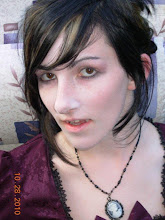There are many differences in seeing a theatrical play as opposed to a film. First of all the environment is completely different. No matter what kind of play you see, it still feels like a higher form of art than seeing a movie, whether it is casual or not. Even seeing something like Dearly Departed, where the audience was in jeans and t-shirts, you still feel like you are in a more creative, educated setting. Especially because only select people who have a passion for the arts and plays, are the ones who usually go to theatrical performances, where as a movie is something everyone and their mother goes to all the time.
Watching actors live is a completely different feeling than seeing them on TV, just as listening to a CD is different than going to a concert. You can feel their energy and their presence from the stage, which makes the experience more personal. In film it is only a 2-D experience and they seem like they are in a different world because they are not physically there. Where as in theatre it is very personal, and you can sometimes even be part of the action. Like in Dearly Departed when they had the church service scene, where you clapped along; or during the end when they referred to the audience as the guests at the funeral.
If an actor sucks it reflects your view of the play as well. In Dearly Departed everyone was really great. They had lots of energy and covered their mess ups well (except the laughing when Delightful got the cheese whiz all over her face on accidentJ). The pantomiming was awesome, especially with all the little sounds (I know that’s hard to do). In a movie you always have sets and props to complete your surroundings. In a movie you don’t see mess ups unless it is shot live, or has a blooper reel; they retake the scenes until they are perfect. You also get to see whatever you want to see in a play. For instance, there were times that I was watching Delightful eat her food instead of the conversation going on just because she did such a hilarious job staying so serious and stupid while she ate. A movie restricts you to what the director wants to show you. Transition from scene to scene is also very different. In a play it is usually a black out accompanied by music or something, which they used in Dearly Departed. In a movie they use slide transitions or fades- they have like a bazillion choices.
One thing I noticed that they did in Dearly Departed, that they do in movies was that the scenes individually showed what each group of people was doing instead of having them freeze or something in the background.
Theatre etiquette is also different from a movie. In a theatre people won’t be talking, generally, in the middle of the play. Like when you scream at the girl about to die in a horror movie, which really wouldn’t happen in a theatre piece. Another thing is people don’t eat during a theatre piece (mostly because you are not allowed to) but its tradition in a movie to have popcorn or candy. You also wouldn’t just walk out on a play, usually, like people do for bad movies because you would offend the actors, when a movie they won’t ever know. Also people clap in between scenes sometimes, which you wouldn’t do at a movie. But if it’s a movie premier there is clapping at the end, like in a play.
So plays are pretty much live action movies, but it puts you at the scene too. There’s a lot that differs the two forms from each other, but they are both art. Dearly Departed was hilarious, I enjoyed it a lot. It was uniquely set up too, having so much pantomime and little props. It was cool because it was something that would really happen, but it was missing normal elements so you still knew you were watching a play. I would recommend it, it looked like lots of fun!
